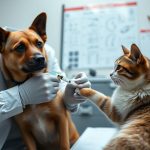You want your senior pet to enjoy their golden years, and a little proactive care can make all the difference. As pets age, their needs change, making regular veterinary check-ups and assessments important for maintaining their health and happiness. This post provides you with a comprehensive checklist recommended by veterinarians, tailored specifically for senior pets, to help you ensure their well-being. From diet adjustments to routine screenings, you’ll learn how to support your beloved companion as they navigate this stage of life.
Understanding Senior Pet Health
Your senior pet requires special attention to maintain their health and well-being. As pets age, their bodies undergo various changes that can affect their overall health. Being aware of these changes will help you provide the best care possible. Regular monitoring and specific lifestyle adjustments can make a significant difference in your senior pet’s quality of life, ensuring they remain happy and active in their golden years.
Common Health Issues in Older Pets
Below are some common health issues that many older pets may face, including arthritis, dental disease, and kidney dysfunction. You might also observe changes in their vision or hearing, along with weight fluctuations and decreased energy levels. Understanding these issues allows you to recognize symptoms early and seek appropriate care, helping your furry friend live a more comfortable life.
Importance of Regular Vet Check-ups
Any pet owner of a senior pet should prioritize regular vet check-ups to identify and address health concerns promptly. As pets age, the likelihood of developing health problems increases, making frequent assessments vital for effective management. Your vet can provide tailored recommendations and monitor existing conditions, ensuring your pet receives optimal care.
Hence, scheduling regular vet check-ups can help detect potential health issues early, leading to more effective treatments. In addition to physical examinations, these visits allow for updated vaccinations, dental care, and discussions about nutrition and exercise tailored for senior pets. Establishing a strong relationship with your veterinarian will help you make informed decisions about your pet’s health and ensure they enjoy a longer, healthier life.
Nutrition for Senior Pets
The right nutrition is fundamental for maintaining the health and vitality of your senior pet. As pets age, their nutritional needs change significantly. They may require diets that are lower in calories but higher in quality protein, fiber, and necessary nutrients to support their aging bodies and combat potential health issues. It’s necessary to tailor their meals to provide optimal nutrition while considering their specific health conditions.
Balanced Diets for Aging Animals
Against common misconceptions, feeding a senior pet is not merely about providing food; it involves offering a balanced diet that meets their unique needs. Aging animals often have slower metabolisms and may develop certain sensitivities, making it vital to select age-appropriate food that maintains their health and promotes longevity. Focus on high-quality ingredients and avoid fillers to give your senior pet a nutritious and satisfying diet.
Supplements and Special Dietary Needs
On occasion, your senior pet might require additional support to thrive. This may come in the form of supplements that address specific health concerns or enhance overall well-being. Common supplements for aging pets include omega fatty acids for skin and joint health, glucosamine for mobility, and antioxidants to boost their immune system. Always consult your veterinarian before introducing any new supplements to ensure they align with your pet’s dietary needs.
Also, consider that some senior pets may develop food sensitivities or chronic conditions requiring specialized diets. Whether your pet is dealing with kidney issues, arthritis, or allergies, a tailored diet can alleviate symptoms and improve their quality of life. Your veterinarian can provide guidance on selecting the right special dietary formulas or therapeutic diets designed to target these conditions effectively.
Physical Activity and Exercise
Any happy, healthy senior pet benefits from regular physical activity and exercise. Keeping your pet active supports their overall well-being, enhances muscle strength, and can even improve mental health. Adjusting the routine according to your senior pet’s unique needs ensures they stay engaged and stimulated while avoiding strain.
Tailoring Exercise to Age and Ability
Before starting an exercise regimen, evaluate your pet’s age, breed, weight, and any existing health issues. This information will help you customize a program that suits their capabilities, ensuring they enjoy safe and enjoyable activity sessions without overstressing their bodies.
Benefits of Regular Activity for Seniors
Exercise not only maintains physical health but also contributes to your pet’s emotional and mental well-being. Regular activity can prevent obesity, reduce common age-related ailments, and improve mobility.
It fosters a positive mood, which is especially important for senior pets, as they may experience anxiety or depression. Engaging in physical activities also helps enhance their cognitive function, keeping their minds sharp as they age. Additionally, regular exercise promotes a stronger bond between you and your pet, strengthening your companionship as they thrive in a happy and active lifestyle.
Mental Health and Enrichment
All pets, including seniors, benefit from mental stimulation and enrichment to support their overall well-being. Engaging your older pets with new experiences, puzzles, and activities helps maintain cognitive function and lowers the risk of depression. Simple adjustments in their daily routine can greatly enhance their mental health, allowing them to thrive in their golden years.
Keeping Seniors Mentally Stimulated
Seniors require regular mental stimulation to keep their minds sharp and engaged. You can achieve this by introducing them to interactive toys, treat puzzles, or even basic training exercises. These activities help promote cognitive function and reduce behavioral issues associated with aging, leading to a happier and more fulfilled pet.
Fun Activities for Your Older Pet
Keeping your older pet entertained and active is vital to their health and happiness. Simple changes in their routine can help, such as leisurely walks to explore new scents, gentle play sessions with their favorite toys, or offering scent games that engage their sense of smell. These activities not only provide physical exercise but also stimulate their mind, ensuring a balanced and enriching life.
And incorporating fun activities into your pet’s daily routine can make a significant difference in their quality of life. Short outings to new environments, engaging them in scent-tracking games, or even creating a cozy space for observation can enhance their mental engagement. It’s vital to tailor activities based on their physical capabilities to ensure their safety and enjoyment. By promoting a variety of stimulating experiences, you’ll help maintain their mental agility and boost their spirits.
Grooming and Hygiene
Now that you’ve welcomed a senior pet into your home, maintaining their grooming and hygiene is necessary for their overall well-being. Regular grooming can help you spot any skin issues, parasites, or lumps early, ensuring prompt treatment. Additionally, keeping your pet clean fosters a strong bond and contributes to their comfort as they age. Tailoring your grooming routine to their specific needs will also enhance their quality of life.
Adjusting Grooming Routines for Senior Pets
Routines should evolve as your pet ages. Senior pets often require gentler handling, shorter grooming sessions, and the use of specialized tools. Their skin may become more sensitive, so it’s important to use softer brushes and hypoallergenic products. Tailoring your approach will make the grooming process more enjoyable for both you and your pet.
Importance of Dental Care
Along with regular grooming, dental care plays a significant role in your senior pet’s health. Oral hygiene is vital to prevent periodontal disease, which can lead to severe discomfort and affect overall health. Routine dental check-ups and at-home care, such as brushing your pet’s teeth or providing dental treats, can help maintain healthy gums and reduce the risk of dental-related issues.
The health of your senior pet’s teeth and gums can directly impact their quality of life. Poor dental hygiene may lead to pain, trouble eating, or even infections spreading to other organs. Regular veterinary dental cleanings and monitoring for bad breath, loose teeth, or gum swelling will go a long way in keeping your furry friend happy and healthy. Prioritizing dental care will ensure that your pet enjoys their golden years to the fullest.
Creating a Comfortable Home Environment
To ensure your senior pet lives happily and healthily, it’s important to create a comfortable home environment. This involves making adjustments that cater to their specific needs and preferences. By providing a supportive atmosphere with easy access to necessities, you can help your furry friend thrive during their golden years.
Modifications for Mobility and Comfort
An effective way to support your pet’s mobility is by modifying your living space. Consider adding non-slip mats to slippery surfaces, using ramps to make access to furniture easier, and providing orthopedic beds for improved comfort. Making these adjustments will enable your senior pet to navigate their environment safely and comfortably.
Safe Spaces for Rest and Recovery
Modifications to your home can significantly enhance your pet’s well-being. Creating designated safe spaces for rest and recovery helps your senior pet feel secure and relaxed. Ensure these areas are quiet, away from heavy foot traffic, and feature comfortable bedding to encourage restorative sleep, important for their aging body.
Creating these safe spaces not only promotes recovery but also provides your senior pet with a sense of ownership and comfort. Select a warm, quiet corner or a cozy crate where they can retreat and feel secure. You might include their favorite blankets, toys, and even a warm light to make it inviting. Regularly check on these areas to ensure they remain clean and comfortable, which will contribute to your pet’s well-being as they age.
Conclusion
Presently, ensuring your senior pet’s happiness and health requires a proactive approach that includes regular vet check-ups, a balanced diet, and adequate exercise. By following the vet’s checklist and addressing any health concerns early on, you can enhance your pet’s quality of life significantly. Staying informed about their specific needs and making adjustments as necessary will help you create a loving and supportive environment for your elderly companion. Your dedication to their well-being is crucial for a fulfilling life together.






